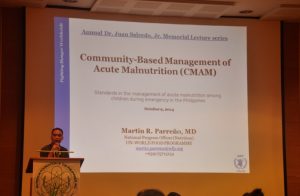NEWS AND UPDATES
Nutrition experts push for nutrition interventions in disaster

Nutrition experts pushed for the inclusion of nutrition interventions in times of disasters during the 2014 Dr. Juan Salcedo Memorial Lecture on October 9, 2014.
“Food and nutrition must be part of our initial response during disasters,” said Ms. Florinda Panlilio, Nutrition Program Coordinator of the National Nutrition Council – Region III (NCC-Region III). Stressing the importance of prioritizing victims’ nutritional status in times of calamities, she warned that acute malnutrition makes disaster victims vulnerable to infectious diseases and other health concerns.
Traditionally, patients with malnutrition are sent to hospitals or health centers for treatment. However, the approach can be disadvantageous to hospitals with limited resources or space. Especially in times of emergencies, Ms. Panlilio said that the approach can cause overcrowding of hospitals.
Dr. Martin Parreño, National Program Officer of the United Nations (UN) World Food Programme (WFP) – Philippines, recommended the integration of community management of acute malnutrition (CMAM) to national program on health, especially during emergencies.
CMAM is a strategic community-based intervention wherein children with acute malnutrition are treated at home, as opposed to the hospitals or medical clinics. It allows health workers to target children most vulnerable to acute malnutrition, conduct in depth screening, and provide selective feeding.
At the moment, the WFP recommends CMAM to countries that has 10% to 14% burden of malnutrition. Despite the country’s 7.9% burden, Dr. Parreño explained that the frequency of disasters makes the CMAM an ideal program for the Philippines.
With over one million young Filipinos suffering from acute malnutrition, Dr. Parreño said that the children are especially vulnerable during disasters. The integration of CMAM in disaster program will help save lives.
The 2014 Dr. Juan Salcedo Memorial Lecture, a nutrition forum annually hosted by the Nutrition Foundation of the Philippine, Inc. (NFP) and supported by the Philippine Council for Health Research and Development of the Department of Science and Technology (PCHRD-DOST).




